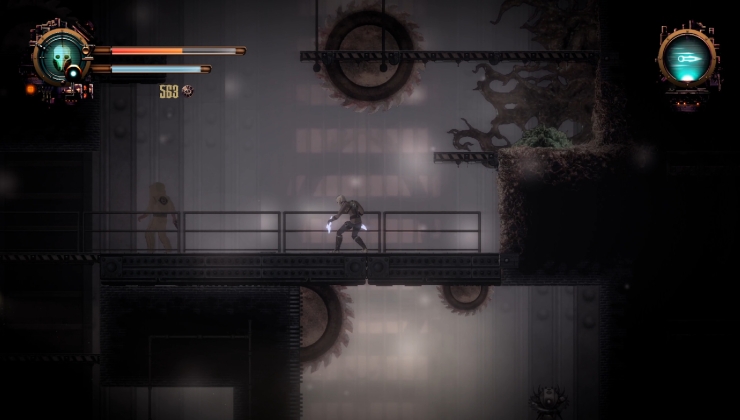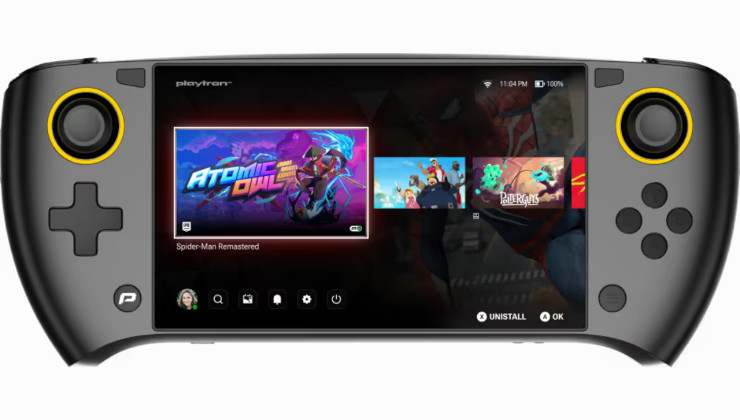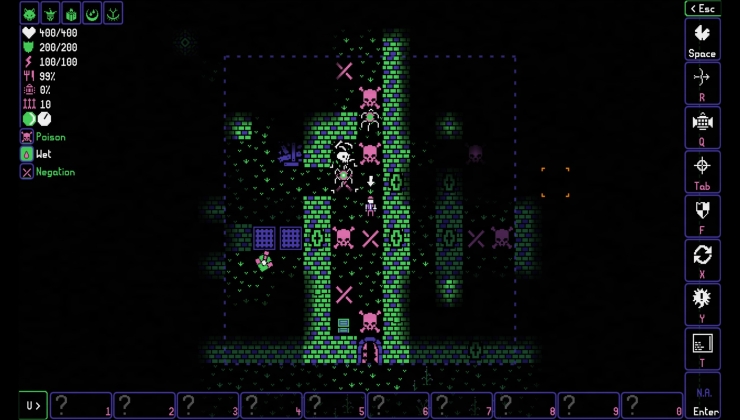With the Stadia streaming service from Google launching on November 19th for those with the Founder's Edition or Premiere Edition, they're finally revealing what will be available.
It will only have 12, yes 12, titles at launch and a few of them are sequels. They are: Assassin's Creed Odyssey, Destiny 2, GYLT, Just Dance 2020, Kine, Mortal Kombat 11, Red Dead Redemption 2, Thumper, Tomb Raider + Rise + Shadow and lastly Samurai Shodown.
The only title you will get included in the Stadia Pro subscription (three months free with the Founder/Premier Edition) is Destiny 2, all others you have to pay for. If you stop paying for Stadia Pro, you lose access to any free games claimed and only keep those you've paid for normally.
Google said more will be coming before 2019 is up like Borderlands 3, Darksiders Genesis, Dragon Ball Xenoverse 2 and more although the dates of them are "Subject to Change". You can see the announcement about them here.
This Debian Linux and Vulkan powered streaming service certainly has an uphill battle to win over gamers and this launch line up, honestly, doesn't seem all that great. With the leaks about Steam Cloud Gaming (#1, #2), Stadia may have an even bigger fight coming.
We have a Stadia Founder's Edition pre-ordered to cover it here, although our thoughts on how Stadia runs on Linux may be quite delayed as they ship it out based on order date. Checking back on it, ours is saying to be delivered by November 27th.
Everyone's their own of course, but I'm surprised how many people state no interest at all in Red Dead Redemption 2.
I'd be interested to play it, but it does seem to be one of the less popular titles among tuxers. However, I won't pay significant money for Windows games. Stadia value would be even lower to me and I don't expect "Stadia store" prices to be in line with what I have in mind. I'll stick with my backlog. Which for some reason keeps growing. :D
Everyone's their own of course, but I'm surprised how many people state no interest at all in Red Dead Redemption 2.
The big AAA games (which are all action games, shooters, or action RPGs) get disproportionate media attention. Sure, they are big, but if we add together all the small niches that are ignored it also becomes huge. Or in other words, a lot of people are interested in that but not the actual majority.
Also, we have a biased sample here. People that are super interested in running such games are, on average, less likely to play games on Linux.
Everyone's their own of course, but I'm surprised how many people state no interest at all in Red Dead Redemption 2.
For me it's mostly that westerns aren't really my thing. They're okay, but not something I want to get really immersed in.
By the same token, Assassin's Creed has fun mechanics, but the Ancient Greek setting ain't doing it for me.
So they ported Red Dead Redemption 2...Maybe they're just using something like Proton with the games Vulkan renderer for this title.
It's nice to see more games come out with Vulkan renderer as an option, although I do wish it was the default api.
Last edited by chimpy on 12 Nov 2019 at 2:19 pm UTC
We are not the target for Stadia, and it's not going to replace or fight against PC market. It's more against console war.
This.
Google literally says at their store:
"Stadia - Games, without a console or downloads"
(In German, it's "Stadia – Spiele ganz ohne Konsole" - it doesn't talk about the downloads part.)
I've seen it called a "virtual console", which seems to fit well.
Everyone's their own of course, but I'm surprised how many people state no interest at all in Red Dead Redemption 2.Granted, the game is being advertised like there is no tomorrow. But this not automatically translates into interest. Don't know for others, but I personally absolutely loathe and despise shooters and am not into westerns in general, either games or movies (being a space-themed sucker since "Space Rangers"). I think, the last western shooter I had played was [Gun.Smoke](https://en.wikipedia.org/wiki/Gun.Smoke) for Dendy (Famicom). I hated it. :D
Other than that, my opinion on Stadia™ has not changed a bit with this huge "revelation". A very weak game set: no games interest me (most I have not even heard of, thanks to only tracking DRM-free Linux-native games).
When taking total cost of ownership into account, I do hope a library of Stadia games proves to be an accessible luxury for people who have heretofore been priced out of the market.
I would argue such a person doesn't exist. Since regional pricing has largely went away, and we frequently see the meme of "1 eur=1 usd" (not for the pound though, for some reason they can convert the dollar to pounds), games became very pricy for "eastern europeans". Whereas in the good old days you could easily get even the most overhyped games for what would be ~20 EUR, nowadays the launch price for such games are closer to 50-60 EUR (not to mention the expansion/DLC fest games that easily go to 100-200 EURs in the first year of their release).
This does not mean, however, that "cloud gaming" is coming. If you want to run it with gigabyte internet, you need quite beefy rig/router, which complicates the cost of Stadia, not to mention the internet bill. My computer for example couldn't run a gigabyte connection too well since i do not have an ssd. Then there is the fact that this offers you nothing except the promise you won't have to buy a console/pc (which is again, not too lucrative for the hidden costs of internet bill/hardware).
I think there is nothing in it, only the inane desire of the industry of total content control and the elimination of the so-called "pirates".
... and we frequently see the meme of "1 eur=1 usd" (not for the pound though, for some reason they can convert the dollar to pounds), ...
Kind of a cheaty way to put it. EUR prices include VAT, USD prices do not.
MacOS User: What did it cost to play games on Linux?
Linux user: Everything
Also the whole "We are not the target audience and it will not affect PC platform" is a load of rubbish. Gylt, a third party game, is already exclusive to Stadia, and you are naive if you think Google would not love to burn regular way to play games to the ground and build more Stadias on top of them. It may not happen in five years or ten, but I'd wager that will be the end goal.
Last edited by Linuxwarper on 14 Nov 2019 at 12:11 am UTC
German computer magazine c't has asked people to play games on PCs without telling them they were streamed - and the people didn't even realize. Furthermore, every online game has the same communication lines to cross...Specialized gaming PCs, or a cheap laptop? Connected with how fast internet? Using a high-quality gaming-oriented router, or the cheap crappy one that your ISP provides? Were these avid gamers, or more casual? What kind of games were they playing? :)
I'm not saying it's impossible, just that there are a lot of variables in this scenario, and a lot of ways to make it look good, where in reality the average consumer might not be able to get the same experience. But hey, maybe I'm wrong and it actually works fine even in less-than-optimal situations. Cool. I'm not interested either way, so it doesn't matter to me. It just seems strange they'd focus entirely on games where any latency would potentially be highly noticeable and don't have any games where a few milliseconds of latency wouldn't really affect the experience. :S:
Specialized gaming PCs, or a cheap laptop? Connected with how fast internet? Using a high-quality gaming-oriented router, or the cheap crappy one that your ISP provides? Were these avid gamers, or more casual? What kind of games were they playing? :)
I don't think I can answer all your questions from [the article](https://www.heise.de/select/ct/2019/1/1546333965757789). But some. They tested a mediocre laptop and a gaming PC, e.g. with Shadow of the Tomb Raider. They used a 1000 fps camera (Sony RX100M6) to measure the time from mouse click to change on the screen, locally and with a streaming service.
They measured 25 to 40 ms locally on the gaming PC and 70 to 100 ms on the notebook. The streaming services added: Parsec/Paperspace 5 to 60 ms, Parsec/Amazon 15 to 50 ms, Shadow 10 to 90 ms. (Worst was Liquidsky, 80 to 270).
For me the ideal cloud gaming service would integrate with the steam cloud so I could continue where I left off at home.
I don't think I can answer all your questions from [the article](https://www.heise.de/select/ct/2019/1/1546333965757789). But some. They tested a mediocre laptop and a gaming PC, e.g. with Shadow of the Tomb Raider. They used a 1000 fps camera (Sony RX100M6) to measure the time from mouse click to change on the screen, locally and with a streaming service.Thanks for the summary, as I can't read German. :) That is interesting, maybe it'll work fine after all. Guess we'll see when more people get their hands on it to review it.
They measured 25 to 40 ms locally on the gaming PC and 70 to 100 ms on the notebook. The streaming services added: Parsec/Paperspace 5 to 60 ms, Parsec/Amazon 15 to 50 ms, Shadow 10 to 90 ms. (Worst was Liquidsky, 80 to 270).
We are not the target for Stadia, and it's not going to replace or fight against PC market. It's more against console war.
This.
Google literally says at their store:
"Stadia - Games, without a console or downloads"
(In German, it's "Stadia – Spiele ganz ohne Konsole" - it doesn't talk about the downloads part.)
I've seen it called a "virtual console", which seems to fit well.
Without downloads?! What is this, play-by-post?
Without downloads?! What is this, play-by-post?
My first Steam game was Skyrim. When I had installed it from DVD, Steam insisted on downloading such a huge "patch" that I couldn't play the game this evening. (I wasn't aware automatic downloads can be disabled.) I had a full DVD and all I needed to play, but still couldn't.
I guess that's what they're talking about. In the end, probably more data crosses the line than with a preinstalled game, so it doesn't help people with "data plan".











 How to set, change and reset your SteamOS / Steam Deck desktop sudo password
How to set, change and reset your SteamOS / Steam Deck desktop sudo password How to set up Decky Loader on Steam Deck / SteamOS for easy plugins
How to set up Decky Loader on Steam Deck / SteamOS for easy plugins
See more from me